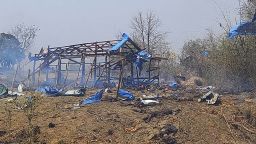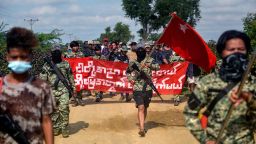Myanmar’s ruling military junta has imported at least $1 billion in weapons and military-related equipment since its bloody coup, according to a new United Nations report which said much of the equipment was coming from individuals and businesses in Russia, China and Singapore.
Army general Min Aung Hlaing seized power in February 2021, ending Myanmar’s brief experiment with democracy, jailing former leader Aung San Suu Kyi and plunging the impoverished Southeast Asian nation into a raging civil conflict that continues to this day.
Battles between the military and resistance groups unfold daily across the country.
Airstrikes and ground attacks on what the military calls “terrorist” targets occur regularly and have killed thousands of civilians, often including children, according to monitoring group.
Whole villages have been burned down by junta soldiers and schools, clinics and hospitals destroyed as a result of the attacks, according to local monitoring groups.
Tom Andrews, the UN Special Rapporteur on Myanmar, published a new report on Wednesday that detailed transfers of arms and raw materials and identified “254 unique suppliers” to the Myanmar military since the coup.
“Since the coup, the Myanmar military has imported at least $1 billion worth of arms and dual use goods to support the military’s domestic arms manufacturing,” Andrews wrote.
In 94% of the transactions Myanmar’s military was listed as the ultimate receiver “eliminating any doubt of who the end recipient would be,” Andrews added.
The report, which used trade data and spanned more than 50 pages, listed $406 million in sales from Russian entities and $267 million from China, including some state-owned companies.
The report also found $254 million in imports originating from Singapore.
Andrews said he received no informatio indicating that the government of Singapore had approved military sales or transferred arms to Myanmar’s military – unlike with Russia and China.
In response to a request for comment from CNN, China’s Ministry of Foreign Affairs accused the special rapporteur of going “beyond his own authorization to smear normal military trade of sovereign countries without warrant, distorting facts and confusing the public.”
The comments did not address the specific allegations or transactions detailed in Andrews’ report.
CNN has also approached authorities in Russia and Singapore for a response on the report’s findings.
Citing a recent deadly attack carried out last month by the Myanmar Air Force on a village in the northwestern Sagaing region, the UN report listed several weapons which were used that included Yak-130 aircraft and Mi-35 helicopters supplied by Russia and raw materials from “private entities in Singapore, China and Thailand.”
“Bombs were released over Pazigyi village in the Kanbalu township, Sagaing region… hitting their intended target: a ceremony attended by approximately 300 people, including dozens of children, marking the opening of a (local) administrativae office,” the report said.
“The ordinance detonated with deadly impact – ripping the bodies of men, women and children open, turning their skin to ash and inflicting critical shrapnel wounds.”
“The attack is yet another example of the Myanmar junta’s probable crimes against humanity and war crimes… and also how (it) is using internationally supplied arms and associated materials to commit atrocities,” the UN said.
Andrews said sanctions against Myanmar’s generals were “easily circumvented” and ineffective.
“Those providing these weapons are able to avoid sanctions by using front companies and creating new ones while counting on lax enforcement,” Andrews said.
“The good news is that we now know who is supplying these arms and the jurisdictions in which they operate. Member states now need to step up and stop the flow of these arms.”
He called on the international community to stop more arms from going to the Myanmar military.
Singapore has previously addressed the topic of arms sales to Myanmar since the coup.
Speaking during a parliamentary session in February, Foreign Affairs Minister Vivian Balakrishnan addressed allegations from experts at the Special Advisory Council for Myanmar (SAC-M) who claimed that Singapore was “functioning as a strategic transit point for potentially significant volumes of items” contributing toward military production by the Myanmar military.
“Singapore complies strictly with our international obligations on international arms sales and transfers, as well as UN sanctions and embargoes against any country,” Balakrishnan said.
“Singapore submits regular reports to the UN Register of Conventional Arms… the government of Singapore decided to prohibit the transfer of arms to Myanmar and also decided not to authorize the transfer of dual-use items assessed to have potential military application to Myanmar.”
“We will not hesitate to take action against those who contravene our laws.”
Correction:
A previous version of this story misidentified the UN Special Rapporteur for Myanmar. His name is Tom Andrews.


